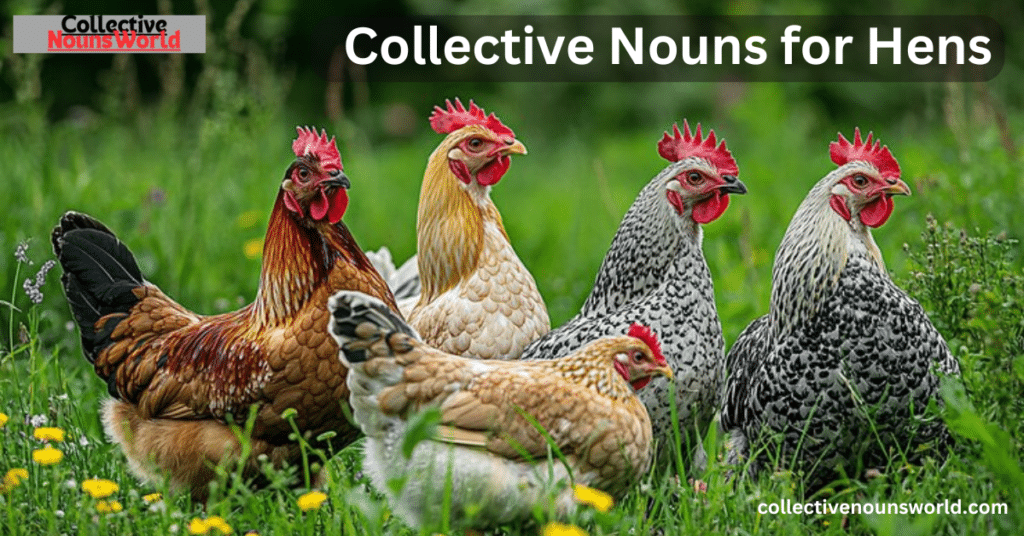Ever wondered what to call a bunch of hens strutting around your backyard? You’re not alone. The world of collective nouns is as fascinating as it is quirky, especially when it comes to our feathered friends. Let’s dive into the clucking, pecking world of hens and uncover the various terms used to describe their gatherings.
| Collective Noun | Meaning | Typical Usage | Example Scenario |
| Flock | A general term for a group of hens | Everyday description of multiple hens together | “The flock of hens roamed freely in the pasture, pecking at seeds and insects.” |
| Brood | A mother hen with her chicks | Describing a family unit of hens | “A protective brood huddled together under the coop’s awning during the rainstorm.” |
| Clutch | A small group of hens or eggs | Often used for eggs, but can apply to a tight-knit group of hens | “The farmer collected a clutch of freshly laid eggs from the nesting boxes.” |
| Parade | A group of hens moving in a line | Describing hens moving in an orderly fashion | “Every morning, a parade of hens marches from the coop to the feeding area.” |
| Peep | A group of hens, often making noise | Used when emphasizing the vocal nature of hens | “The excited peep of hens announced the arrival of fresh vegetable scraps.” |
The Versatile Flock
When you think of a group of hens, the first term that probably comes to mind is a flock. It’s the most common and widely used collective noun for these feathered ladies. Picture this: you’re writing an email to your friend Sarah about your new rural lifestyle:
“Hey Sarah,
You won’t believe how my life has changed! Just this morning, I watched a flock of hens pecking away in the misty fields. It’s like I’m living in a storybook!”
A flock perfectly captures the image of hens moving together, foraging for food, and creating a lively scene in the farmyard. It’s a term that extends beyond hens to various birds, making it versatile and widely recognized.
The Nurturing Brood
When we’re talking about a mother hen with her chicks, we often use the term brood. This collective noun emphasizes the nurturing relationship between a hen and her offspring. Imagine you’re a farmer updating your blog about life on the farm:
“Today, I witnessed something heartwarming. A brood of hens and chicks ventured out into the sunlight for the first time. The way the mother hen clucked and guided her little ones was simply magical.”
The term “brood” beautifully captures the protective nature of a mother hen and the tight-knit family unit she creates with her chicks.
The Cozy Clutch
A clutch typically refers to a group of eggs or newly hatched chicks, but it can also describe a small group of hens. This term evokes a sense of closeness and warmth. Let’s say you’re texting your neighbor about borrowing some eggs:
“Hi Bob, I was wondering if your clutch of hens has been laying well lately. I’m short a few eggs for my famous quiche recipe!”
Using “clutch” in this context adds a touch of charm and familiarity to your message, showing you’re in tune with chicken terminology.
The Proud Parade
For a more whimsical description, you might opt for a parade of hens. This term paints a picture of hens strutting their stuff, showing off their feathers in all their glory. Imagine writing a children’s story about life on the farm:
“Every morning, Farmer Joe would watch with delight as a parade of hens marched across the barnyard, their feathers gleaming in the early sunlight. It was nature’s very own fashion show!”
This term adds a dash of humor and elegance to the description of hens, making it perfect for creative writing or storytelling.
The Cheerful Peep
While less common, a peep of hens is another charming collective noun. It’s often used for chicks, but can apply to a small group of hens, especially when they’re being particularly vocal. Picture yourself leaving a voicemail for your veterinarian:
“Hi Dr. Martinez, it’s Emma from Sunshine Farm. I’ve got a peep of hens that seem a bit under the weather. Their clucking sounds off. Could you swing by when you have a moment?”
Using “peep” adds a touch of lightness to the message, even when discussing a potentially concerning situation.
The Fascinating World of Collective Nouns for Hens
Collective nouns do more than just describe a group; they paint a picture, set a mood, and often reveal something about the nature of the animals they describe. When it comes to hens, these terms reflect their social nature, their role as mothers, and their place in the animal kingdom.
The Social Structure of Hens
Hens are inherently social creatures, thriving in communal living situations. Their social structure is complex and fascinating. In a typical flock, you’ll observe hierarchies, friendships, and even squabbles – much like any human community!
When you’re dealing with backyard chickens, understanding these dynamics can be crucial. For instance, if you’re emailing a fellow chicken enthusiast about integrating new hens:
“Dear Rachel,
I’m thinking of adding three new hens to my existing flock of five. Any tips on introducing them without ruffling too many feathers? I’m worried about disrupting the pecking order!”
This email showcases your understanding of hen behavior while seeking advice, demonstrating the importance of recognizing the social nature of these birds.
The Language of Hens
One of the most charming aspects of keeping hens is learning their language. From soft clucks of contentment to loud squawks of alarm, hens are surprisingly communicative. This rich vocabulary is one reason why terms like “peep” and “cluck” have found their way into our collective nouns.
Imagine writing a blog post about the joys of raising chickens:
“There’s nothing quite like the sound of a contented flock of hens. Their gentle clucking is nature’s own lullaby, a soothing backdrop to country life. But don’t be fooled – when there’s excitement in the coop, like a freshly laid egg, the volume can rival a rock concert!”
This description brings the reader right into the farmyard, letting them almost hear the hens through your words.
The Nurturing Nature of Hens
The term “brood” highlights one of the most admirable qualities of hens – their instinct to nurture. A mother hen is fiercely protective of her chicks, guiding them, keeping them warm, and teaching them to forage.
Let’s say you’re writing an article for a parenting magazine, drawing parallels between human and hen mothering:
“In many ways, a brood of hens mirrors a human family. The mother hen, much like a human mom, is always on alert, ready to shield her chicks from danger. She’ll teach them to scratch for food, show them where to find the best treats, and tuck them under her wings at night. It’s a beautiful reminder of the universal nature of motherhood.”
This comparison not only informs about hen behavior but also creates an emotional connection for the reader.
Hens in Literature and Culture
The humble hen has pecked its way into our cultural consciousness, appearing in everything from nursery rhymes to idioms. Terms like “mother hen” have transcended their literal meaning to describe any overly protective person.
Imagine you’re crafting a speech for a farming conference:
They’ve been companions, teachers, and even metaphors for human behavior. When we say someone is ‘hen-pecked’ or praise a ‘mother hen’, we’re drawing on a rich cultural understanding of these remarkable birds.”
This excerpt showcases how deeply ingrained hens are in our language and thinking, elevating the discussion beyond mere animal husbandry.
Practical Applications of Hen Collective Nouns
Understanding the various collective nouns for hens isn’t just a matter of trivia – it can be practical in many situations.
In Agriculture and Farming
For those in the agricultural sector, using the right terminology can be crucial. Whether you’re managing a large poultry farm or keeping a small flock of backyard chickens, knowing when to use “flock” versus “brood” can help in clear communication.
Consider this excerpt from a farm management manual:
“When moving hens between coops, it’s often easier to transport a small clutch at a time rather than the entire flock. This reduces stress on the birds and makes the process more manageable. However, when dealing with a brood, extra care must be taken to keep the mother hen and her chicks together to avoid distress.”
This guidance provides clear, specific advice using appropriate terminology.
In Creative Writing
For authors and poets, the rich variety of collective nouns for hens offers a palette of evocative terms to paint vivid pictures with words.
Here’s a snippet from a potential children’s story:
“On Grandpa’s farm, the day began with a parade of hens marching out of the coop. They spread out into a busy flock, scratching and pecking at the earth. In a quiet corner, a brood of fluffy chicks huddled under their mother’s wings, while nearby, a clutch of young hens took their first dust bath together.”
Each collective noun here adds to the imagery, helping young readers visualize the scene.
In Education
Teachers and educators can use these terms to make lessons more engaging. Whether it’s a biology class studying animal behavior or a language arts lesson on descriptive writing, collective nouns for hens provide excellent teaching material.
Imagine a worksheet for a primary school class:
“Fill in the blank with the correct collective noun for hens:
- The farmer watched as a _ of hens scratched in the dirt.
- The mother hen gathered her _ of chicks under her wings.
- A proud _ of hens strutted across the barnyard.
Answers: 1. flock, 2. brood, 3. parade”
This exercise not only teaches vocabulary but also encourages students to think about why certain terms might be used in different contexts.
Conclusion:
From the common flock to the charming parade, the collective nouns for hens reflect the diverse ways we perceive and interact with these fascinating birds. Whether you’re a farmer, a writer, or simply someone who appreciates the quirks of language, understanding these terms adds depth to our discussions about hens.
These collective nouns do more than just describe groups – they give us insight into the nature of hens, their behaviors, and their place in our culture. They remind us of the nurturing relationship between hens and chicks, the social nature of these birds, and the joy they bring to our lives.

Luna Jasper is an experienced blogger with a passion for language and grammar. At **Collective Nouns World**, she shares her expertise in exploring the fascinating world of collective nouns, making learning both engaging and fun. With years of writing and research under her belt, Luna’s insightful articles help readers understand and appreciate the English language.







